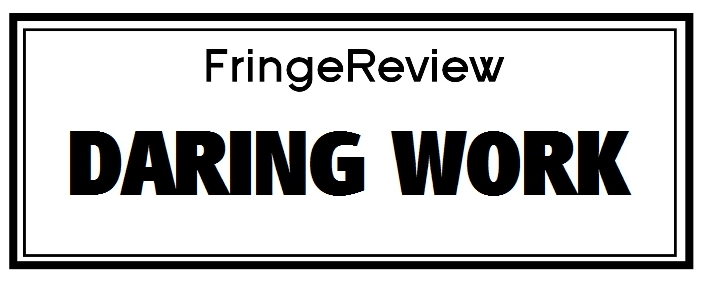Hollywood Fringe 2019
Guilt
Ryan Lisman and Benjamin Schwartz

Genre: American Theater, New Writing
Venue: The Blank - Second Stage
Festival: Hollywood Fringe
Low Down
Showcasing two disparate new short plays from Fringe veterans Ryan Lisman and Benjamin Schwartz, Guilt wonderfully utilizes the intimacy of the Blank’s second stage theater and underscoring from live percussion to compellingly convey their stories.
Review
One of my favorite things about Fringe is that it gives playwrights an opportunity to try new risks while honing their craft. Guilt offers an unusual combination of new works from two Fringe veterans whose styles are widely different, but by coming together have created an intriguing hour of theatre. Ben Schwartz has a solid reputation for writing numerous award-winning Fringe hits, such as Angel’s Flight or Zip Ties, while Ryan Lisman is a well-known Hollywood Fringe iconoclast whose previous shows have had a polarizing effect on his audiences for their avant-guard nature—Apathy Killed the Cat was 90 minutes with full frontal nudity, aberrant sexuality, and fantasy sequences of actors in cat masks. The collaboration between these two playwrights was intriguing, to say the least, and what resulted was an interesting balance of the two men’s creative sensibility.
The first play, “The Holy Name of Apostasy” was originally written by Lisman with Schwartz joining the effort in later drafts. As is Lisman’s style, the play is imbued with a vague strangeness centered on sexual repression but does not quite spin out into full chaos—a groundedness we can most likely attribute to Schwartz’s contribution. Here, Dylan (Brandon Courture), a young man seeking to become a priest, has an intense encounter with “Mother Dawn” (Varda Appleton) who, in this world, occupies a new position in the Church as some kind of female priest thanks to reform efforts. It’s not quite clear what we are supposed to take away from this piece—it begins with a Dylan’s vivid description of a violent encounter he had in class, but this unexpectedly falls away and is never addressed again. Abuse of Dylan is mentioned as the impetus for Mother Dawn’s rise to power, but again is glossed over in exchange for a somewhat disorienting and sexually charged interaction. Ultimately “Apostasy” is a surreal musing on power, sexuality and the Catholic Church—it seems to indicate regardless of who is in power, male or female, the temptation to use this authority to control others will always be present.
The first play was a bit bewildering in content, but felt rooted somehow by the live accompaniment, which, in Birdman style, continued throughout both pieces. Playing on a platform above the stage like percussive guardian angels, the musicians proved crucial to lending an extra sense of gravitas to the piece. The lingering sense of doom created by the ambient music they created added a much-needed extra layer of meaning to the sometimes inscrutable interactions between Mother Dawn and Dylan.
“Man vs. Armadillo” was a complete tonal shift but maintained a sense of unity thanks to the continued presence of the musicians. The dim stage was transformed by circular LEDs downstage and the sonic landscape, evoking the feel of a dark, dank backyard, in which a half senile Dick (Kevin Scott Allen) obsesses over his hunt of an unseen Armadillo, much to his son’s chagrin (played by Ryan Lisman.) Lisman and Allen create a very realistic and sympathetic father-son relationship, filled with frustration, anger, sorrow, strain and love. The play, while maintaining a kind of sinister feel thanks to the underscoring, also possessed a welcome sense of lightness, inviting the relief of laughter. Unlike the first piece, “Man vs. Armadillo” didn’t seem to take itself too seriously, which made its more dramatic turns all the more powerful. It was entertaining, atmospheric, and touching, a brief and interesting glimpse into a father-son relationship.
Both pieces felt like they had room for growth, though “Man vs. Armadillo” felt more fully realized. I’d love to see the first play infused with some of the self-awareness of the second piece, and as mentioned, it could use another pass to focus in on the plot elements that were most important. “Armadillo” had a very strong core in its relationship between the two, but I believe there’s more to mine potentially when it comes to Dick’s senility—his confusion versus lucidity seemed to waver in a fashion that was remarkably convenient for this conversation with his son, which hailed back to some past transgression it seemed would be unlikely for him to remember in his state. It also felt a little odd that the son would speak to him in such a candid manner without being warier of which version of his father he was talking to this time. I’d love the play to explore more the son’s negotiation of his father’s jumps in time.
All critiques aside, I did still find Guilt to be an interesting theatrical experiment worth watching. While it might have had some uneven results, it absolutely revealed the boundless potential live scoring a show has on more dramatic non-musicals.


















































